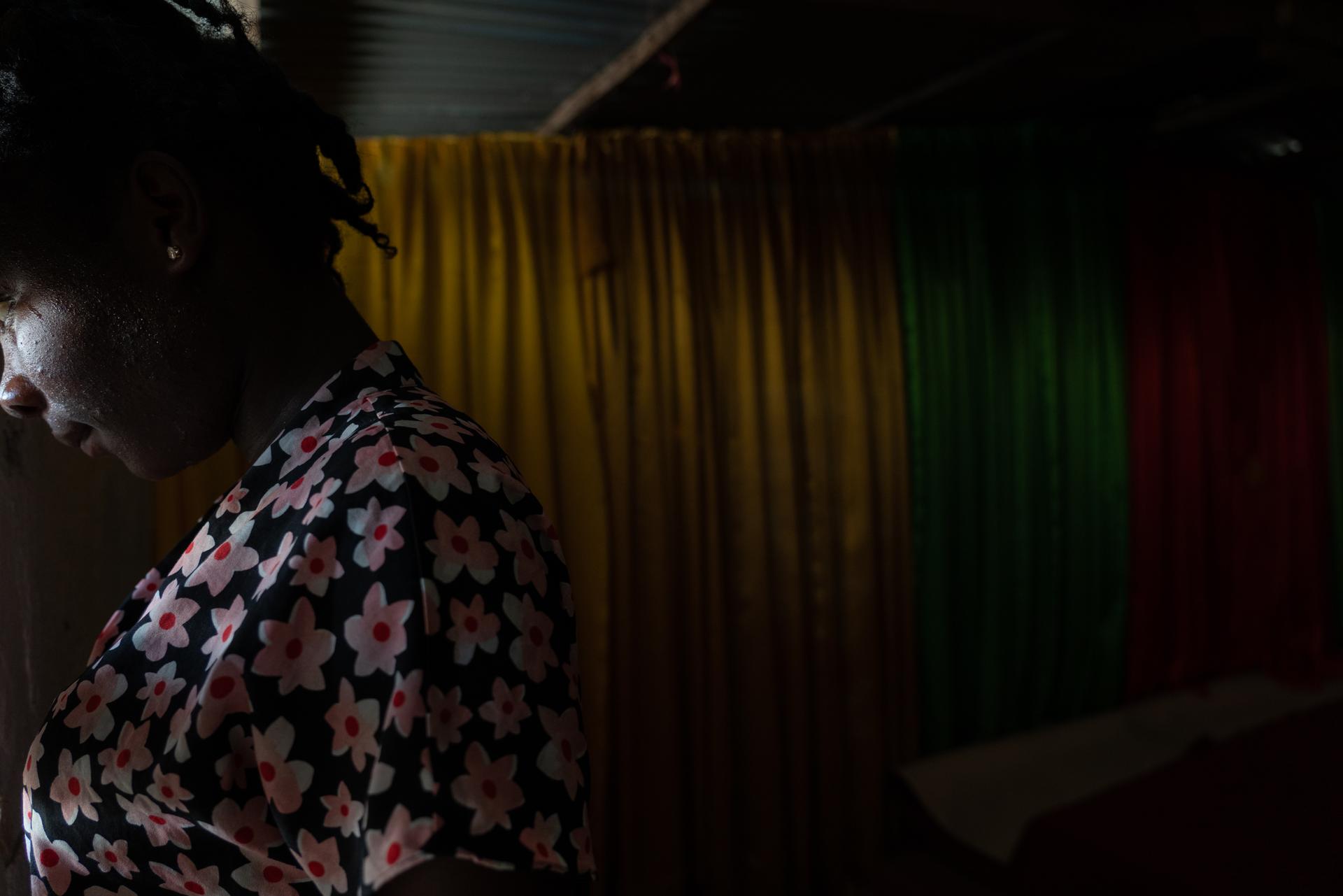The Liberian women who took on their traffickers and won
Life was bleak for 24-year-old M. at the end of 2021. M. was living in her pastor-father Michael’s church compound in Monrovia, the capital of Liberia, and had no job, no education and few prospects.
The pandemic and global economic turmoil had hit her father’s parishioners hard. He could no longer send his six children to school.
M., whose full name isn’t being used for her safety, spent her days doing odd jobs and dreaming of a different life. When M.’s friend, Princess — who’s only being identified by her first name — came to her with a job offer overseas, she thought her dreams had come true.
“She told me she was traveling to Dubai, and her uncle had a job opportunity there,” M. said, sitting at a table in the church with her parents, whose full names are also not being used. “I was happy to help my family, my brothers, my sisters.”
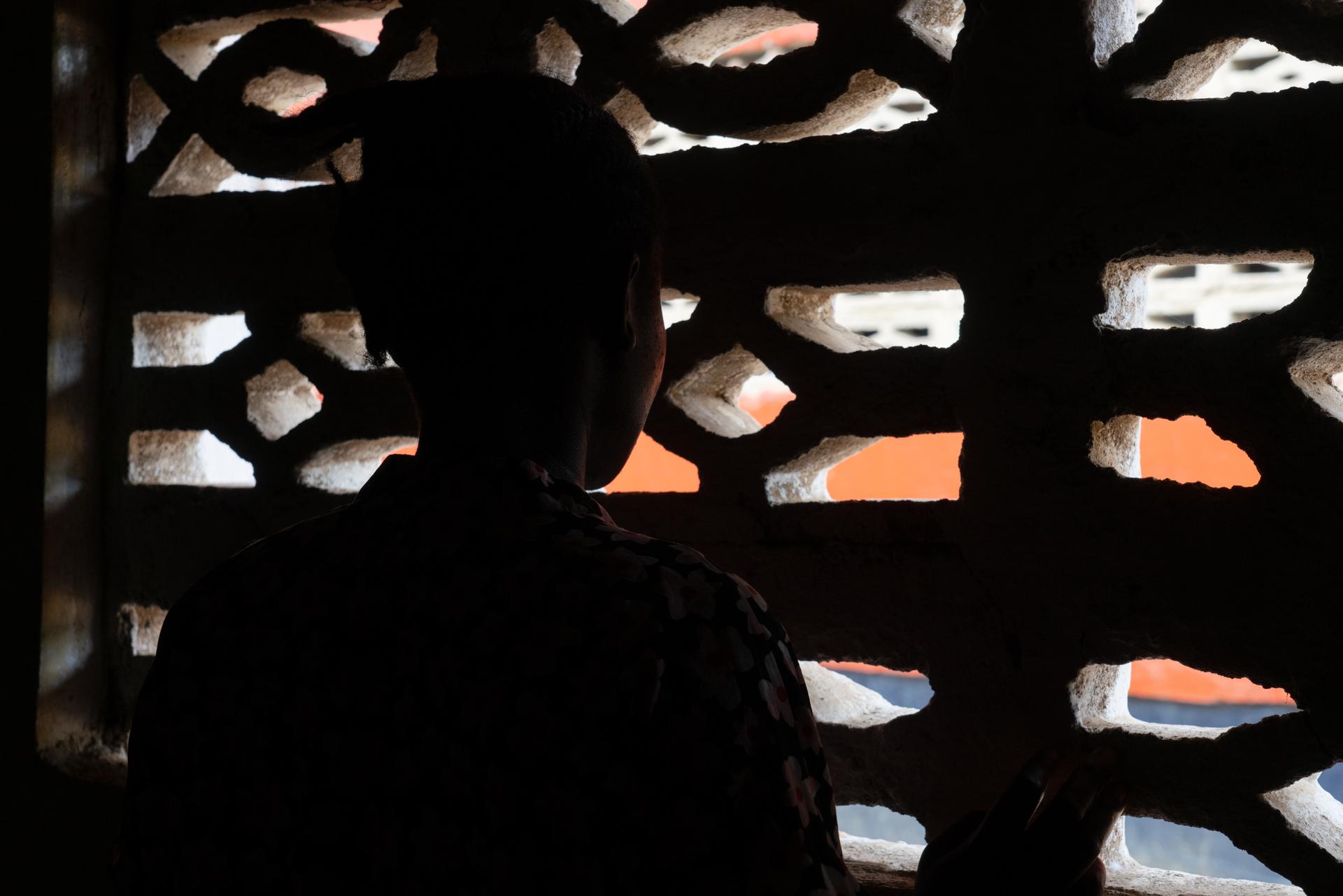
Michael was suspicious and demanded to speak with Princess’ uncle, Samuel Chan Chan, who promised him that the job was legitimate. M. would work in a printing press in Dubai making $500 a month. That was a large sum to a Liberian family where the gross domestic product per capita is $630 a year, and schoolteachers make $150 a month. Michael agreed.
Samuel Chan Chan told the family they needed to pay $500 to his wife based in Monrovia, and get a passport for their daughter and ensure she passes a COVID-19 test. The family scraped the money together. Then, one night in December, M. and her parents got into a taxi, drove to the airport and said a teary goodbye.
As M. disappeared into the terminal, she carried the weight of her family’s dreams of a better future.
Inside the airport, Samuel Chan Chan’s brother, Arthur Chan Chan, a national security agent, whisked M. past security checkpoints where agents are trained to spot potential trafficking victims. Arthur Chan Chan demanded $75 for his services.
M. said that alarm bells started sounding for her before she got on the plane. The visa that Arthur Chan Chan gave her was for Oman, not Dubai. When she landed, an Omani woman demanded that she hand over her passport. M., wary, refused at first, but she eventually gave in. Over the next few hours, the reality of her situation became clear.
M. was taken to an office filled with women from different parts of the world: Bangladesh, the Philippines and many African countries. It was an agency supplying domestic servants to Omani households. In a scene that she described as alarmingly reminiscent of African slave trades of old, Omanis came in to inspect the women and haggle over price. Asians — considered harder workers — cost more. Africans the least.
It was here that M. said that she first learned about human trafficking.
Typical modern slavery scams in the Middle East are orchestrated by agents who sell domestic servant contracts to households. In Oman, households pay a $1,500 fee to the agent as well as the cost of return flights. Households typically pay the servants $200 a month for long days with no days off. The contract lasts for two years.
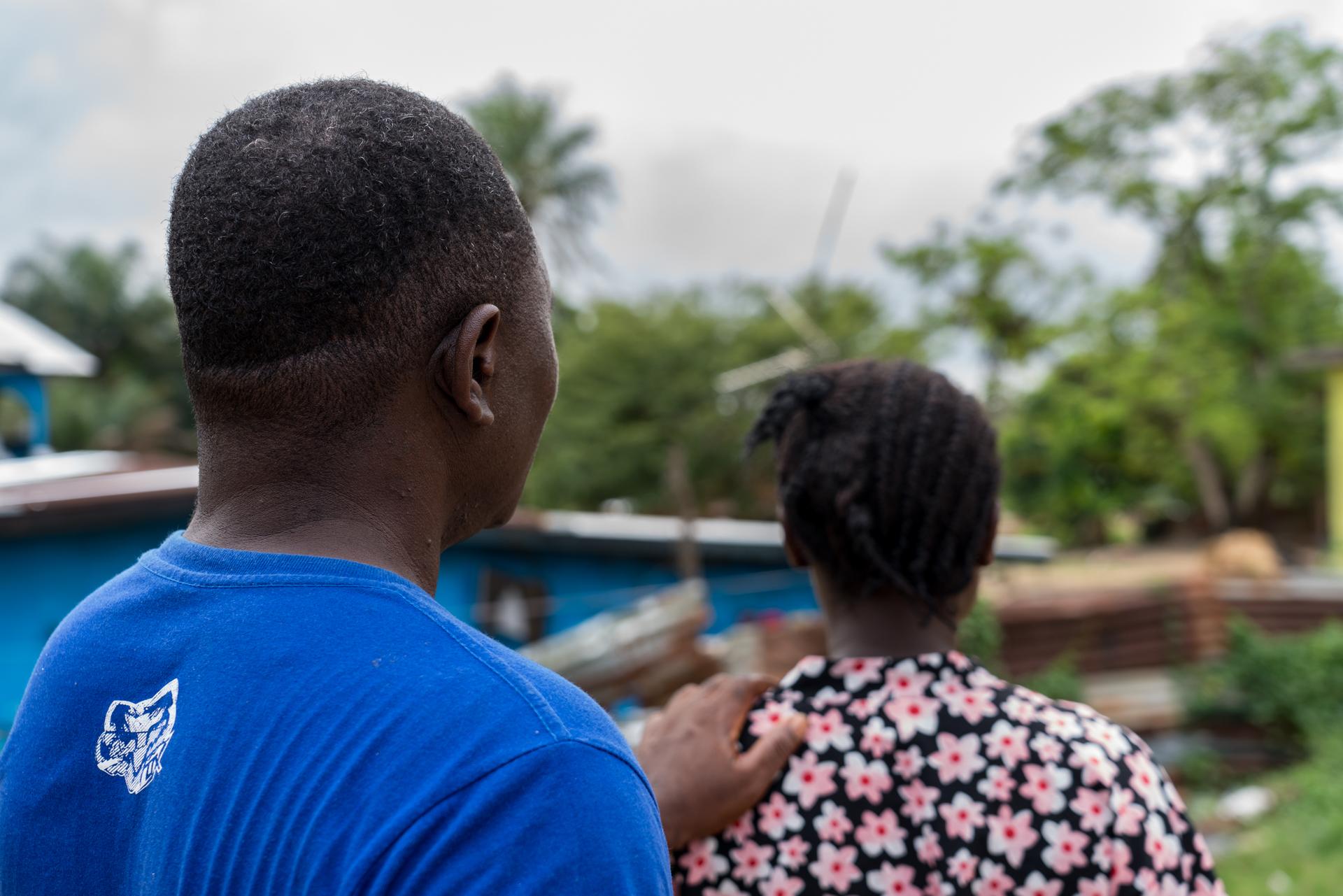
The challenge for agents is that even the poorest women are not interested in that deal. So, the agents enlist local people like Samuel Chan Chan to deceive the women with promises of decent jobs, opportunities to study and no mention of the contract. When the women want out, they’re told the only way to get their passports back is to repay the fee.
Samuel Chan Chan did not appear to need much encouragement to sell out his fellow Liberians. His online history shows that after winning a fellowship to the Arab Africa Summit in Egypt in 2018, he started offering his services on forums recruiting women to work as housemaids in the Middle East.
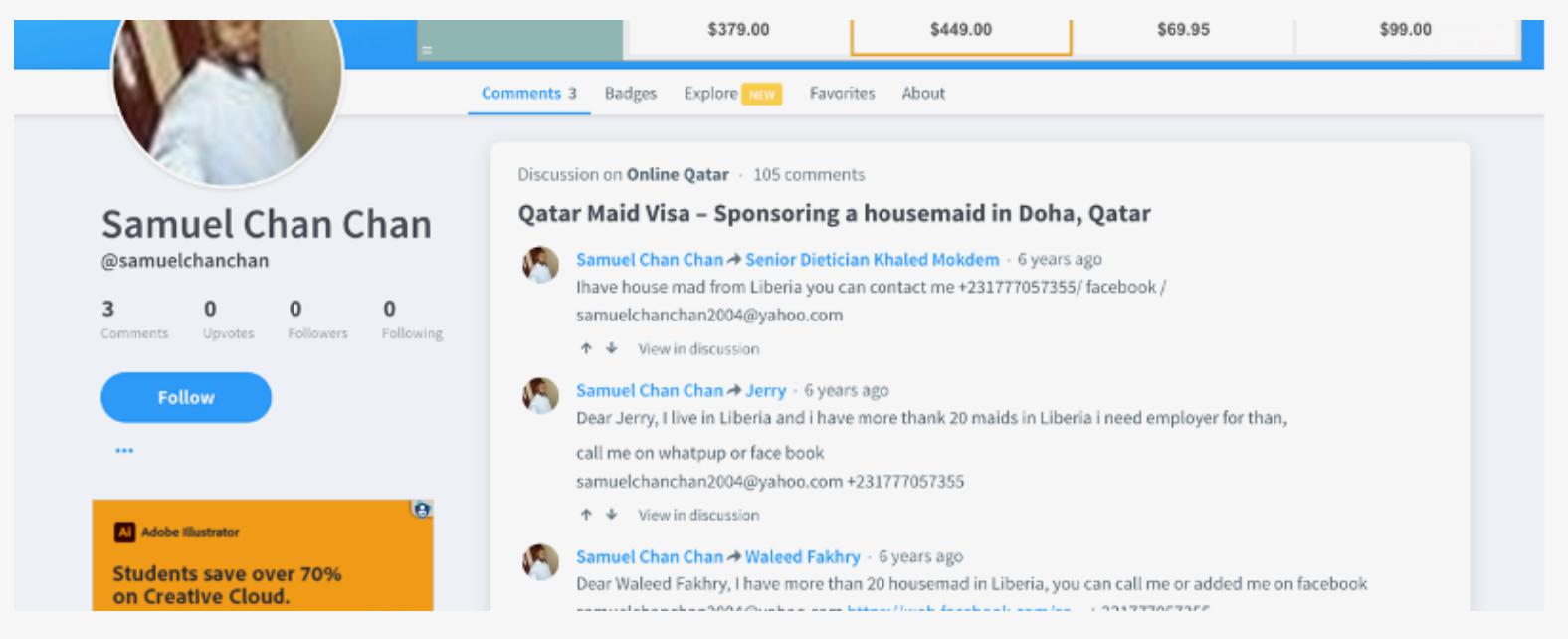
“I have more than 20 maids in Liberia i need employer for than (sic),” he said in one post.
By 2021, he had relocated to Dubai and made connections with Omani agents including Al Ayadi Al Amina Housemaid Supply whose business card was obtained by one of the trafficked women. Liberian authorities say that more than 350 Liberian women were lured to Oman by the ring in 2021 and early 2022.
Samuel Chan Chan did not respond to The World’s requests for comment sent through Facebook messenger.
M. found herself working in a household with 15 people in 10 bedrooms and eight bathrooms. Only the mother spoke enough English to communicate with her. M. said that she had to wake at 4 a.m., prepare breakfast, get the children ready for school and then, clean all day and cook. The family ate first, and she got what was left over.
“And when they eat the food and there is not enough, they will not give you food to eat,” she said.
M. often went to bed at midnight. She was not allowed outside the compound and got no days off.
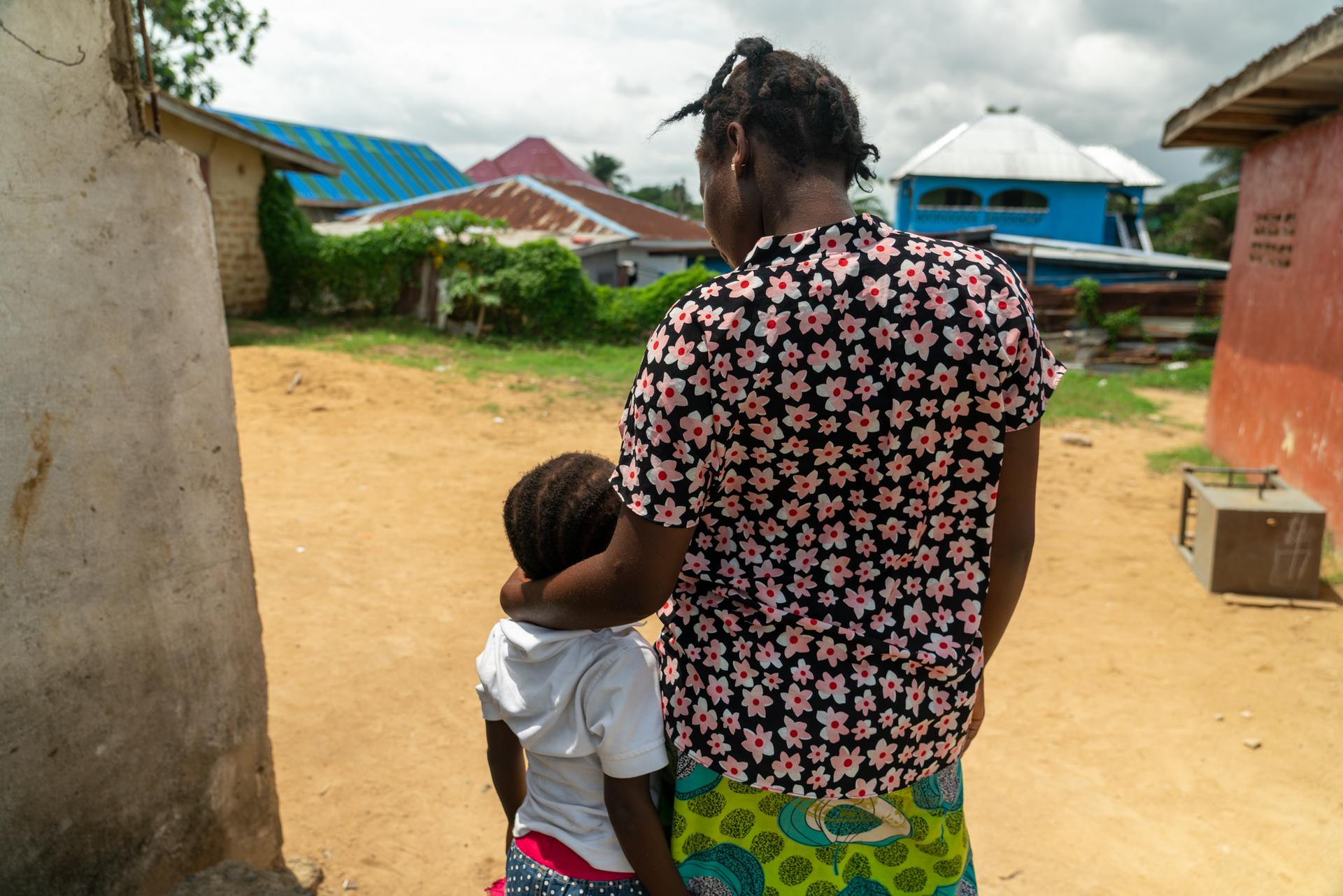
After a couple of weeks, M. refused to work. The agent moved her to another house and another. At one point, he beat her and broke a finger, she said, showing her crooked left ring finger that is healing on an angle.
Eventually, the agent had M. arrested on a fake charge that she had stolen his phone. She said that she was imprisoned in a dark cell with no light for 10 weeks. Five other African women in the jail were beaten and starved. She claimed that one, from Tanzania, died.
“It was like hell in the prison,” she said, struggling to contain emotion. “Too much hell.”
A typical trafficking scenario like this is possible in the Middle East under the kafala system, run by agents who sell servant contracts to households. The households pay a fee to the agent and the costs of flights. Families typically pay the servants $200 a month – not the $500 M. expected.
M.’s story echoes that of five other returned trafficking victims that The World spoke with in this investigation. One said that she was raped. All were beaten.
M. told her agent she wanted to speak with Samuel Chan Chan. That’s when she learned the truth: “He said he bought me for [US] $3,000 from Samuel Chan Chan,” she recalled. “He said, ‘You can go home but first, you have to pay me the $3,000.’”
In Monrovia, Michael said, the family was getting desperate. Sporadic phone calls from his daughter terrified them. The traffickers were also calling, threatening to kill M. if they didn’t pay her fee.
Michael contacted everyone who might help, including police, government officials, other families and Samuel Chan Chan over and over again.
“To have a child go there to try to help the family, for her to see it, and say, ‘Because of our poor condition, I’m going to go and find something to help,’ and then, to end up in jail. It was very painful,” he said, shaking his head at the memory.
For most of the millions of victims of trafficking, this is where it ends. Desperate poverty brought them there in the first place. Some families will stretch themselves to the breaking point to borrow the money to free victims from the contract. But most are trapped, at the mercy of agents. Even when the contract ends, many agents pressure victims into another.
But the Liberian women in Oman were not willing to give up. Most servants carry cellphones so they can be summoned quickly. Some had snuck in their own Liberian SIM cards. They switched out the chips to connect with other Liberians and formed a WhatsApp group. They took photos and videos of what was happening and sent heart-wrenching messages to family and media outlets in Liberia. And, they made a video that went viral.
“We were sent here by some guys who call themselves ‘agency,’” a woman on the video says, surrounded by M. and five other women. “They lied to us. We never knew it was all about this human-trafficking issue.”
Her speech is intercut with footage of a woman fighting two Arab men trying to hold her. Other shots show women crying as they sweep floors. The video also presents a payment slip that M. found, which indicates that Samuel Chan Chan had received money from the agent, an Omani named Said Mohammed Said Khamis al-Kaabi.
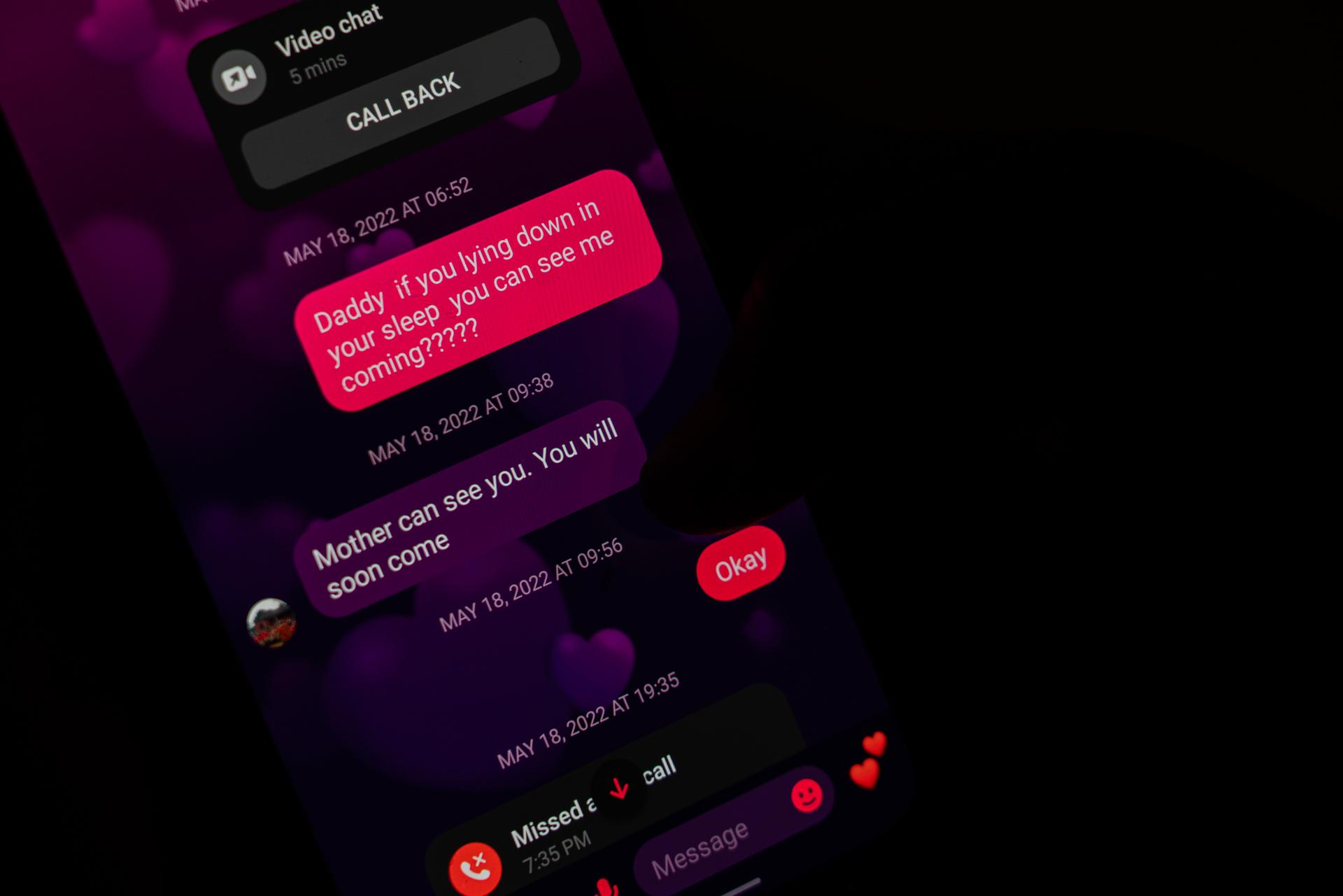
Oman has laws against the mistreatment of domestic workers but they’re rarely enforced. An African woman claiming she was deceived into a contract is never believed, they say — and authorities only act when the woman can prove physical violence, which is rare. Omani authorities did not respond to a request for comment.
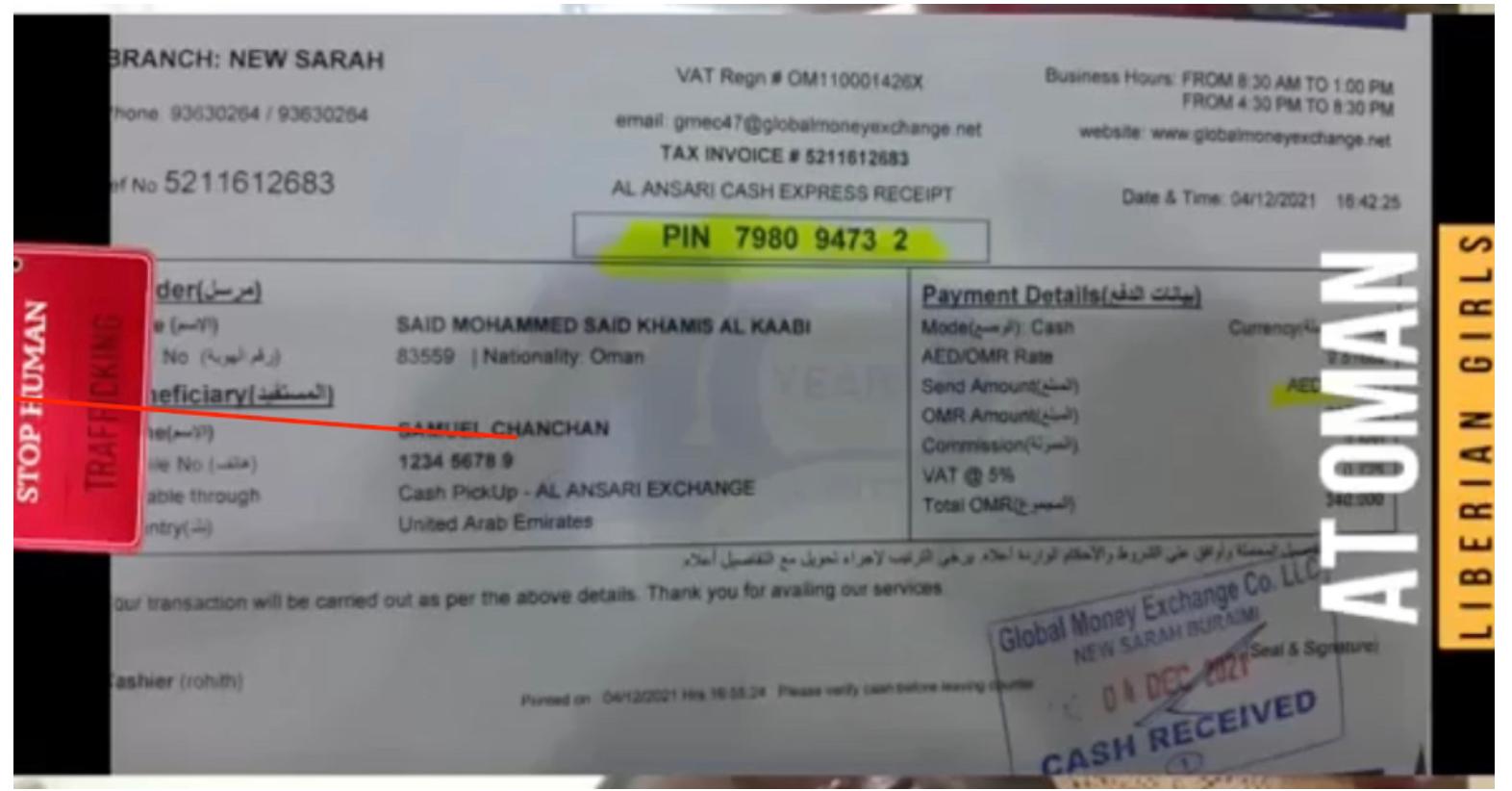
The video and the women’s desperate calls from Oman made it to Liberian newspapers, Facebook and radio talks shows. Parents demanded the government take action.
The Liberian government also faced pressure from abroad. President George Weah’s administration faced a cut in badly needed US aid if it didn’t step up efforts to combat trafficking. Congress cuts aid to countries that stay on the State Department’s anti-trafficking watch list for more than two years in a row. The US provides more than half of Liberia’s $200 million annual foreign aid, which is equal to 12% of the country’s annual budget.
Diplomatic communiques were sent to the Omani government. Oman agreed to stop granting visas to Liberians, according to officials in Liberia’s anti-trafficking unit.
The women found two key allies: One was an African working undercover in Oman who cannot be identified in order to keep helping trafficking victims. The other was Canadian Ward Reddick, who had taken it upon himself to help African trafficking victims after a Ugandan friend had been caught in a scam and he had been unable to find anyone else to help. The pair worked with a Liberian consular officer in Dubai who was given full authority to help the women.
The group set up safehouses. But the women still had to escape the agents. The first women to escape jumped over the walls of the compounds where they were working. Two told The World that they spent three terrifying weeks hiding in the streets of Muscat, eating out of trash cans before other victims connected them with Reddick. As time went on, the consular official, communicating secretly with M. and the other women through Whatsapp, sent cars to collect them. He issued travel documents. Omani authorities let them go.
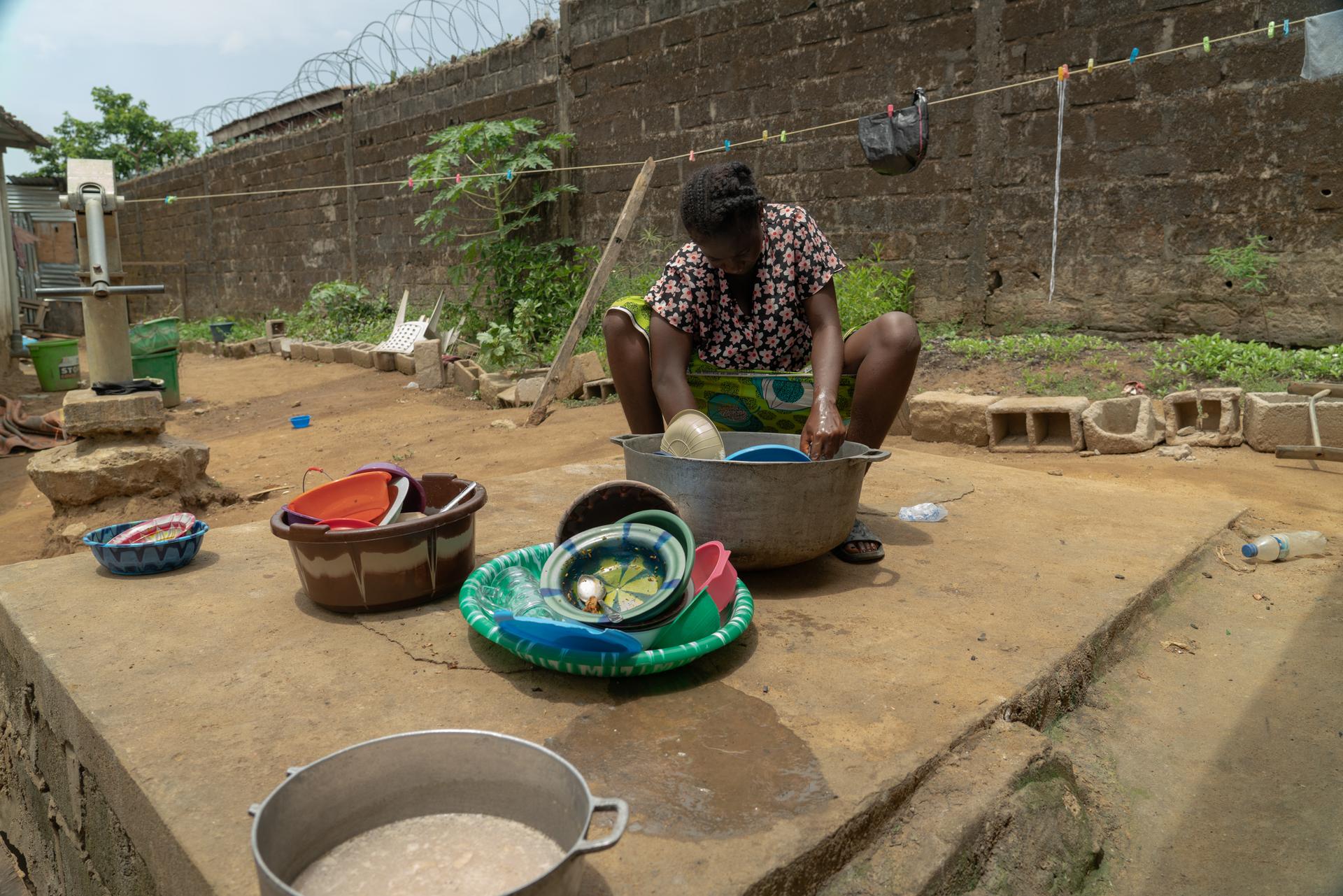
Six months after the first women left Liberia, they started to arrive back home in March of 2022.
Officials with Liberia’s Anti-Trafficking Unit said that more than 250 of the estimated 350 have returned. More come home every week. The outcome is unprecedented, according to Drew Engel, anti-trafficking adviser at the US Embassy in Monrovia.
“I’ve never heard of anything this size, a group sort of mobilizing, organizing, however, they managed to do it. I’ve never heard of anything quite like this in my, probably, 15 to 20 years of being involved in countering trafficking in persons cases.”
Reddick said that the women’s solidarity through the long fight is a lesson for others.
“One of the worst parts of being a victim of modern slavery is the isolation,” he said in a call from his home in Vancouver. “It’s the belief that you’re truly, absolutely alone, and that nobody cares. Even your family may not be willing to put up the money to bring you home. That’s when they can really go downhill. The women bolstered each other’s hope in a really positive way. They never felt alone. They never felt isolated. And in some small way, that is a bit of control over your life.”
Eight months after M. left home trying to change her family’s fortunes, she landed in Monrovia.
M., who sat in the family’s compound, teared up at the memory of seeing her 4-year-old daughter emerge, finally, from the airport.
“Tears of joy,” Michael said, smiling. “I was so happy. I was acting like a man. I did not shed tears but I was deeply, deeply thankful to God. It was a very, very joyful day for us.”
A Liberian court has asked police to issue an international arrest warrant for Samuel Chan Chan who is believed to be in the Middle East. His brother, Arthur Chan Chan, is serving a 25-year prison sentence after his conviction for trafficking earlier this year. It’s the longest sentence ever given for trafficking in Liberia. In 2021, the Liberian Legislature had made the minimum sentence for trafficking 20 years.
M. was one of two women who testified against Arthur Chan Chan. He was ordered to pay her $6,000 in restitution. The money would change her life but she has little hope of seeing it. Though Arthur Chan Chan is estimated to have made more than $26,000 for his part in the scam, authorities have done nothing to seize his assets while he appeals his conviction.
But it’s Samuel Chan Chan, not Arthur Chan Chan, M. said, whom she wants to see in jail.
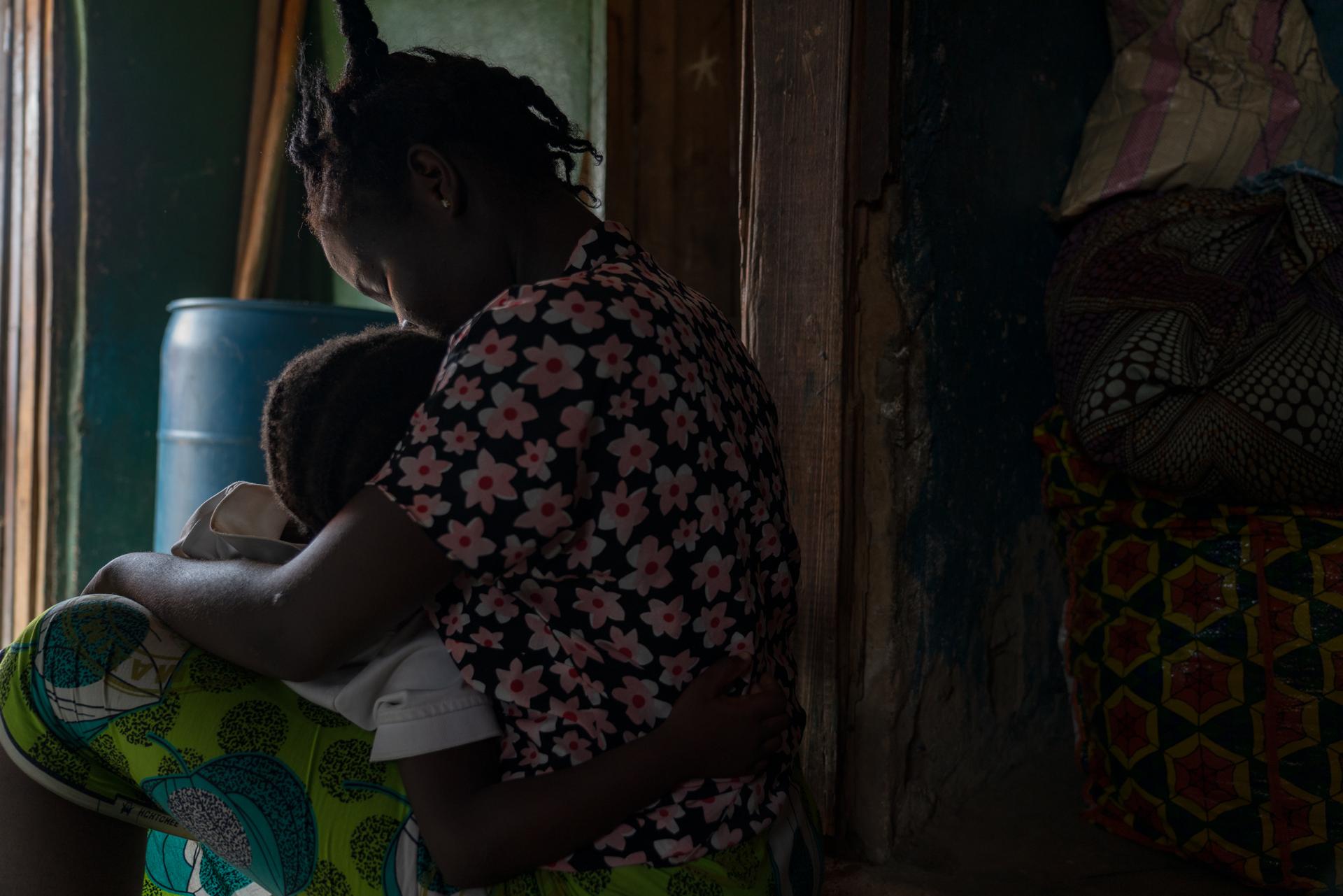
Engel said that the outcome is an important example for governments across Africa — it shows what can happen when officials are motivated to stop trafficking. But in the end, he said, credit goes to the women.
“The victims’ complaints [in the media] and WhatsApp groups [organizing] became very powerful tools to raise awareness about the situation and make it rather untenable for employers and agencies and others to keep many of these women in Oman against their will,” Engel said.
Experts warn demand is so great that traffickers will likely move on to another vulnerable country. But Reddick agrees that there’s much to be learned from the Liberian women.
Today, life for M. is no easier than it was when she left. But she is grateful to be home. She and other women who made it back are now united in fighting for psychosocial support, job training and justice.
M. has been threatened for testifying. Though the government has not provided her with protection, she said that she’s not stopping. She wants other women to know that if something sounds too good to be true, it probably is.
Anthony Stephens and Prue Clarke are with New Narratives.
Funding for this story was provided by the International Women in Media Foundation and the US Embassy in Liberia.
